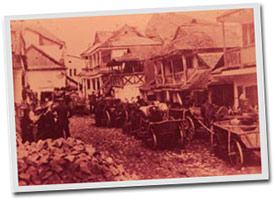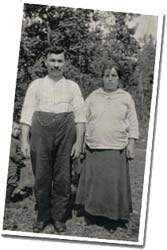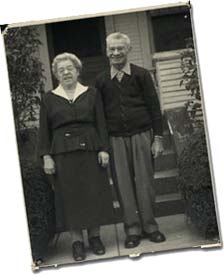|
| Conversation in the Kitchen
On a recent Jewish New Year's, while hanging around the kitchen with my siblings, my sister commented that the table was the same one used by our zeide (Yiddish for grandfather) when he came to Los Angeles in 1925. This innocuous comment began a discussion about where he (and therefore, we) came from. None of us really knew his complete story and there was no body alive from his generation to tell us. But, we each had enough fragmants of his narrative to weave together a tapestry of our family history. |
Leah:
"I remember Zeide saying that he left Russia about 1909, before the revolution. He wanted to escape the stifling life of the shtetle, along with the probability of being conscripted into the Russian army. |

A street scene in a Russian shtetl. |
| He was young, single and ready for the opportunities that existed in America. And although he had been a member of one of the Zionist-labor organizations in Russia, he was also a practical man, so rather then Palestine, New York was his destination." |
|
|
Alan:
"I remember zeide describing his impression upon arriving in New York. He thought that the Statue of Liberty was personally welcoming him. He had never seen such a large, busy city.
While in New York, he met Anna and married her. She told him that she had relatives in a city in Canada, so they decided to try their luck there. Little did they know that the city was actually a small town in the boonies. There was a Russian and Jewish community so they were not completely alone up there. They opened up a small general store and began to raise their family." |

The Gimovskys in Canada, about 1915. |
|
|

Zeide's Canadian Railroad pocket watch. |
Benjamin:
"Yeah, Zeide spoke a lot about that little store and his various customers- other Russian immigrants, traders, even some Indians. That is where he attained the pocket watch that I use. Here, look, it is a Canadian Railroad watch. He said that this style of watch doubled as a timepiece and brass knuckle ‘ they called it a "kopf knocker"- a head banger and was used for self-protection against bad guys. |
|
|
Leah:
"After 12 years of harsh winters, with 5 children, he decided to come to Los Angeles. That was in 1925. Mom was 5 years old then. Zeide had a dairy route, with a horse and cart (the horse lived in their back yard). The neighborhood that they lived in was mostly filled with Jewish immigrants from Eastern Europe. But not completely – they had neighbors and customers who had come from Mexico, Japan, China, Greece and other countries. " |

Kosher milk bottle, circa 1920 |
|
Alan:
"He would say that one of the greatest things about this country was that he, as an immigrant could not only have his own business without the oppression of the anti-Semitic government, he could have neighbors from all over the world- this could not have happened in Russia. Because his children went to a public school, they too were able to develop relationships with other families."
Benjamin:
"I remember growing up and going to a florist shop and nursery that was owned by a Japanese family. They were always extremely nice to me and always spoke said such good things about zeide. Why was that?"
Leah:
"Don't you know? Before the war the Kurasawa family were some of Zeide's best customers. Also, their children and our aunts and uncles went to school together and were friends. But during the war, things were really bad for them. The Kurasawa boys managed to get drafted and fight in the 442nd in Europe. That is except for one, who was a doctor and remained stateside and worked in a hospital. But the daughters and parents were sent to a relocation camp, even though the parents had lived her for so long and their children were citizens because they were born here. This hit zeide very hard. He could not believe or understand that this kind of action was happening here, especially after what he had seen and experienced in Russia. He said that these actions were a "shanda"- a bad, bad thing and should not be happening in America. He made a decision to help his friends however he could, so he (and his sons) managed and ran the Kurasawa's nursery for the duration of the war. It wasn't easy- what with his own dairy wagon and raising his children. But this is the way that he was raised. After the war, when the Kurasawas returned to Los Angeles, returned the keys to their house and business along with the profits from their business."
|

The Gimovskys in Los Angeles, after the war. |
Alan
"The Kurasawas never forgot this act of kindness and generosity. Whenever there was a celebration or party, they always supplied the most beautiful flowers and never took a dime." |
|
Return to main |
|




